Curated OER
Neuroscience for Kids
In this neuroscience learning exercise, students explore the Neuroscience for Kids website and then complete the questions. Students compare axons and dendrites, the central, peripheral, and autonomic nervous system, and the different...
Curated OER
Archaeology For Kids Quiz 13
In this archaeology for kids quiz 13 learning exercise, learners interactively answer 5 multiple choice questions about ancient / old things as part of an online magazine.
US Environmental Protection Agency
A Mock Town Meeting on a Proposed Tank Farm
Intended as a follow up to the Protecting Your Drinking Water activity, young environmentalists use their assessment of the a hypothetical town's water supply to debate the installation of underground chemical storage tanks. With the...
Curated OER
Photosynthesis Lesson Plans
You can teach students about the importance of plants and the process of photosynthesis with motivating lesson plans. Follow along and find out how one science teacher uses experiments, stories, and her love of plants to get kids excited...
American Chemical Society
Mysterious M&M's
The first in a six-lesson mini unit, all using M&Ms® candies, this physical science activity gets kids to observe a single piece and discover what happens when it is placed in a plate of water. The activity can be used to introduce...
Earth Day Network
Staying Green While Being Clean
Clean up the environment with a lesson that focuses on replacing hazardous cleaning supplies with green, environmentally-friendly products. Using a dirty patch of surface as a control area, kids clean other parts of various surfaces...
Curated OER
Water Pollution
Fifth graders study the impact of human activity on water quality and on the ecosystems of Earth. After a discussion on the various ways that water can be polluted, groups of youngsters get together to figure out the best way to clean a...
Beyond Benign
12 Principle Match Up
Can you find a match? Scholars review the 12 principles of green chemistry by playing a matching game. The second lesson of the series reinforces the principles from the first lesson. Individuals play the matching game and also complete...
San Francisco Public Utilities Commission
Pesky Plastics: The Problem with Plastic
What can happen to the environment if plastic continues to pollute it? Learners read about the implications of plastic on health, water, and nature in a two-page reading passage. After they finish reading, they work on six comprehension...
Global Change
The Carbon Cycle and its Role in Climate Change
So how does the carbon cycle work? Kids participate in a hands-on activity that allows them to understand the chemistry behind climate change and global warming. They act out the process of photosynthesis by labeling themselves as...
Florida Department of Environmental Protection
Build Your Own Aquifer
Ever wondered how an aquifer works? Introduce your class to the amazing way many people get water by exploring how underground aquifers work. Two fun hands-on activities are used to help kids understand what an aquifer is, how it works,...
K12 Reader
Plants Are Producers
Here's a handy two-part activity that uses an article about plants to assess reading comprehension. After reading the passage, kids answer questions based on the information in the text.
Curated OER
Reading Comprehension 8
What is a gall, and where is one typically located? Learn about this interesting insect home while reading this short passage. If you're looking to give your kids some test prep, this is a great resource for you! After reading the short...
California Academy of Science
Pollution in Our Watershed
The concept of a how pesticides and other chemicals pass through a watershed can be difficult for younger learners to grasp without a concrete example. In the activity here, some blank paper, markers, and a spray bottle are all you need...
K12 Reader
The Rock Cycle
This cross-curricular reading comprehension worksheet asks kids to read a passage of the rock cycle and then to use information in the article to respond to a series of questions.
Curated OER
Pollination of Flowers by Moths
Turn your classroom into a pollination station as your kids transform into moths or predators trying to survive and aiding in plant reproduction along the way. Using silent party blowers as proboscises, the moths will have two minutes to...
Curated OER
First Aid
First aid is a skill anyone can and should learn. Give kids a good set of life skills such as tending to small wounds, bleeding, sprains, or insect stings. Slides provide text to reinforce each major first aid skill. Tip: You need a...
Curated OER
Hazards of Defrosted Food
Peas spoilage hot, peas spoilage cold: examine the bacterial growth on newly defrosted peas versus peas that have been defrosted for 24 hours. Using the session one questions in the "Microbes and Food Spoilage" PDF, learners will make...
Polar Trec
What Is My Footprint?
How do one's habits and lifestyle choices affect the environment? Through a short online survey, learners will calculate their own carbon footprints then determine how to reduce their impact on the environment through simple steps, such...
Perkins School for the Blind
The Three Basic States (Phases) of Matter
There are three basic states of matter: Solid, liquid, and gas. Help your learners with visual impairments to understand the chemical nature of each state of matter with tactile elements. Marbles are used to model the particles in each...
Curated OER
Breaking News English: Working Mothers Pass on Stress to Kids
In this English learning exercise, students read "Working Mothers Pass on Stress to Kids," and then respond to 47 fill in the blank, 7 short answer, 20 matching, and 8 true or false questions about the selection.
Curated OER
Safe Pets, Safe Kids
Students explore the concept of pet safety. In this pet safety lesson, students discuss dangerous objects and settings for humans and pets. Students find or draw pictures of these objects/settings and create a bulletin board for display.
Curated OER
M&M Science and Math
A series of math and science activities feature M&M's® as manipulatives to help kids work through equations. The resource includes exercises on finding averages, percent of compositions, moles in chemical reactions, genotypes and...
Science-Class.net
Rock Candy Crystals
Candy is one of my favorite words, and it's an even better word when it relates to science. Yes, candy science can happen when you grow rock candy crystals with your class. The entire process for growing these edible wonders of nature is...

























